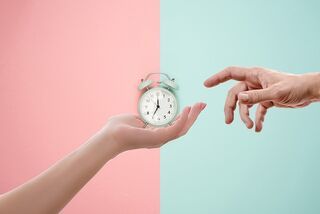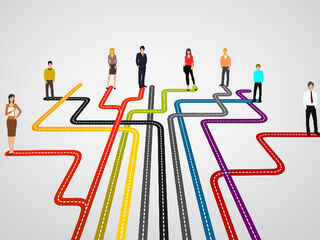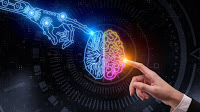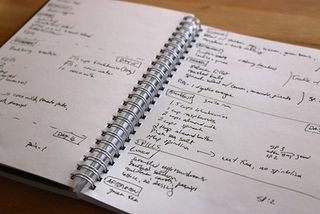Marty Nemko's Blog, page 220
June 2, 2020
Giving as Healing: A tool for enhancing your mental health
 After a talk by famed psychiatrist Karl Menninger, an audience member asked what to do about a patient who felt a nervous breakdown coming on. Everyone expected Menninger to recommend in-depth therapy or drugs. Instead, he suggested, "Leave your house, find someone in need, and do something to help that person.”
After a talk by famed psychiatrist Karl Menninger, an audience member asked what to do about a patient who felt a nervous breakdown coming on. Everyone expected Menninger to recommend in-depth therapy or drugs. Instead, he suggested, "Leave your house, find someone in need, and do something to help that person.”Indeed my clients and I have found that giving can be healing. That may be especially important today. The double-whammy of the COVID lockdown and racial roiling is making many people sadder and more anxious. For example, a Statista analysis of government statistics finds anxiety and depression spiking.
Of course, everyone chooses to give differently, but my Psychology Today article today offer some ideas to spur your thinking
Published on June 02, 2020 17:45
May 30, 2020
Careers for Generation COVID: Options for the New Abnormal
 The job market that Generation COVID is facing is harder and different. Of course, my advice varies with the client, but my Psychology Today article today presents areas I've invited clients to consider.
The job market that Generation COVID is facing is harder and different. Of course, my advice varies with the client, but my Psychology Today article today presents areas I've invited clients to consider.
Published on May 30, 2020 17:10
May 25, 2020
Leaders’ Tough COVID Task: Handling a corona-caused layoff
 Sure, being a leader is prestigious and often lucrative. But there are downsides, some of which are more common amid the COVID economic shutdown, for example, having to lay off people.
Sure, being a leader is prestigious and often lucrative. But there are downsides, some of which are more common amid the COVID economic shutdown, for example, having to lay off people.Of course, every situation and every leader is different, but my Psychology Today article today offers one way that painful situation might be approached. After, I’ll list the principles that were embedded.
Published on May 25, 2020 01:10
May 23, 2020
Happier in the COVID Lockdown? A surprising number of people are
 Of course, there are reasons for the coronavirus pandemic to make you sad. Maybe you’ve been laid off or precluded from working because your job is at, for example, a hotel or restaurant. Or the closing of schools has made you responsible for childcare 24/7. Or you might have been okay with Stay-Home for a while, but cabin fever has taken over. Or you contracted the coronavirus. Even if your case is mild, it isn’t fun having a flu-like disease nor being quarantined. And merely hearing of the pandemic-sized death toll sobers even a Pollyanna.
Of course, there are reasons for the coronavirus pandemic to make you sad. Maybe you’ve been laid off or precluded from working because your job is at, for example, a hotel or restaurant. Or the closing of schools has made you responsible for childcare 24/7. Or you might have been okay with Stay-Home for a while, but cabin fever has taken over. Or you contracted the coronavirus. Even if your case is mild, it isn’t fun having a flu-like disease nor being quarantined. And merely hearing of the pandemic-sized death toll sobers even a Pollyanna.But among the not-so-vulnerable people who will, at some point, have a choice to resume life sort of as we knew it, most—yes surprising to me, most—people I’ve spoken with say they're, net, happier now.
It’s been said that we’re social animals and that we crave freedom. So how can anyone be happy with less human interaction and less freedom: We can’t go to work. We can’t go to restaurants, concerts, ballgames, bars, nightclubs. In certain jurisdictions, we can’t even invite friends to a picnic in the park. We can’t yet get our wild hair cut.
My Psychology Today article today offers some thoughts on why.
Published on May 23, 2020 21:12
May 18, 2020
AI: Maximizing the Potentials, Minimizing the Perils
 It’s easy to see both the up- and downsides of artificial intelligence.
It’s easy to see both the up- and downsides of artificial intelligence. Just a few upsides: more accurate medical diagnosis, safe, fast automated vehicles, AI-driven instruction that ever adapts its style and pace based on the student’s ongoing performance.
On the downside, luminaries such as Bill Gates and Elon Musk worry that self-teaching AI computers could get smart enough that humans won’t be able to stop them from nefarious ends.
It would seem that, per Stuart Russell, author of Human Compatible, that we optimize risk/reward if we take two steps: 1. Don’t let the computer “know” the goal of the software. 2. Block the computer from making decisions beyond a certain magnitude—that when implications of a decision go beyond a certain point, human override is required. It’s kind of like the car salesperson who has discretion to give a 10 percent discount, but if more seems required, the boss must approve.
Another fear about AI is that an evil individual or entity could use it to nefarious ends. A few examples: release a murderous virus into the water supply, threaten to close down the electric grid unless paid a zillion dollars, or develop an algorithm for manipulating people into voting for Candidate X. (Whoops, that already pretty-much exists.) Of course, most powerful things, notably nuclear energy, could be used cataclysmically, yet most experts conclude that, rather than prohibit it, it’s wiser to install in-computer and human oversight.
A similarly moderate stance could apply to genomic research. On the upside it could better address such diseases as cancer, diabetes, and cardiovascular disease and create drought-resistant-, high-protein, and insect-repellant crops. Gene editing might eventually be used to create a super-intelligent human. Yes, that person’s brainpower could be used for social good but what if the gene-editing also caused him or her to have to live in physical pain? Or the person could use the hyper-intelligence for personal gain even if it causes great pain to the world. Again, it would seem that regulation, both legal and built-in might yield the risk/reward sweet spot.
What worries me is that such restrictions may move such research to jurisdictions that have looser ones. For example, the worldwide consensus has been that gene editing be conducted only for research, not clinically. He Jiankui defied that by using CRISPR to edit the early embryos of two recently born twin girls in what he said was an effort to prevent them from contracting HIV. Russian scientist Denis En toto, it’s probably wise to establish restrictions on AI: laws, professional standards, and, more difficult, building in limitations to AI software: forcing them to switch off when the stakes are great or the implications unclear. Social norms and fear of punishment will facilitate research that has a positive risk-reward ratio while restraining less advisable research. Outright bans would likely yield far worse net results, as occurred when religious influences restricted scientific research in the Dark Ages. It seems we must accept that the perfect is the enemy of the good. Despite the likely excesses, it seems wise to bet on humankind, that, net, we’ll probably derive positive effects from AI. It certainly will be interesting to watch.
Published on May 18, 2020 00:46
May 15, 2020
Our Multiple Authentic Selves
 A client today said that she doesn't want to be a phony and has a hard time being her authentic self. I explained that we have multiple authentic selves; each is a different part of ourselves. Using a particular persona in an interaction isn't phony, it's flexible, the opposite of narcissistic. She found the concept liberating.
A client today said that she doesn't want to be a phony and has a hard time being her authentic self. I explained that we have multiple authentic selves; each is a different part of ourselves. Using a particular persona in an interaction isn't phony, it's flexible, the opposite of narcissistic. She found the concept liberating.I explain, including a list of possible authentic selves, in my Psychology Today article today.
Published on May 15, 2020 21:02
May 14, 2020
On Turning 70 The thing I most want to tell you
 I’ll be 70 next month and wanted to write something special. To come up with something I thought might be worthy, I reviewed my thoughts on career, relationships, money, mental health, physical health, and the meaning of life. One thought rose to the top. I talk about it in my Psychology Today article today.
I’ll be 70 next month and wanted to write something special. To come up with something I thought might be worthy, I reviewed my thoughts on career, relationships, money, mental health, physical health, and the meaning of life. One thought rose to the top. I talk about it in my Psychology Today article today.
Published on May 14, 2020 21:00
May 13, 2020
The Daily Eating Plan; A good tool for weight loss?
 I have tried so many things to try to lose those 20 pounds, and yes it’s harder when sheltering in place. Even though I’ve purged my home of my danger foods (well, most of them), sufficient calories remain in my house and my restraint is inconsistent enough that I'm still wearing those 20 pounds.
I have tried so many things to try to lose those 20 pounds, and yes it’s harder when sheltering in place. Even though I’ve purged my home of my danger foods (well, most of them), sufficient calories remain in my house and my restraint is inconsistent enough that I'm still wearing those 20 pounds.Well, I got an idea today amid my daily morning reverie between sleep and getting up: What if I made a list of what I plan to eat that day? I’m decent at completing my to-do list, so might it help me lose weight?
I put the list plus some motivators on the kitchen counter where I do my food preparation. I share what I wrote and how I did on Day One in my Psychology Today article today.
Published on May 13, 2020 21:02
May 12, 2020
The Books by My Bed: What I’m reading during the lockdown
 During the day, I read too much about corona. At bedtime, I want to read anything but.
During the day, I read too much about corona. At bedtime, I want to read anything but.One of my many bad habits is to clutter my bedroom, even the bed, with too many books, a number of which I’m reading at the same time. Perhaps one or more might tempt you, at least temporarily, away from COVID obsession. I describe them in my Psychology Today article today.
Published on May 12, 2020 21:02
May 11, 2020
Often-Asked Career Questions Amid the Pandemic
 Amid COVID, my career counseling clients are asking the same questions only with greater worry. My Psychology Today article today offers two common questions and my responses.
Amid COVID, my career counseling clients are asking the same questions only with greater worry. My Psychology Today article today offers two common questions and my responses.
Published on May 11, 2020 21:05
Marty Nemko's Blog
- Marty Nemko's profile
- 4 followers
Marty Nemko isn't a Goodreads Author
(yet),
but they
do have a blog,
so here are some recent posts imported from
their feed.



